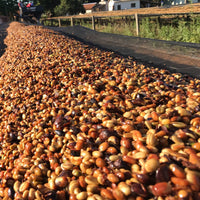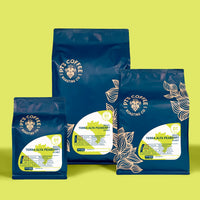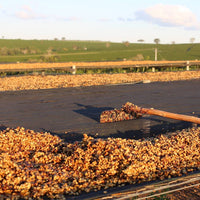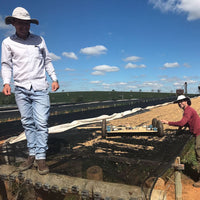Brazil | Terra Alta
Peaberry Honey
Nougat, Green Grape, Walnut




Brazil | Terra Alta
Peaberry Honey
Nougat, Green Grape, Walnut
This peaberry from our Direct Trade partners in Brazil opens with aromas of nougat, baked apple, and milk chocolate. Notes of butter toffee and roasted almond are balanced with crisp green grape acidity in the round-bodied cup, resolving into a satisfying finish of semi-sweet chocolate and walnut.
Producer: Paulo and Juliana Piancastelli
Farm: Fazenda Terra Alta
Region: Ibiá, Minais Gerais
Altitude: 960-1,021 masl
Varietal: IAC 125 RN, Catuai 62
Process: Honey
Roast: Light-Medium
Notes: Nougat, Green Grape, Walnut
This specially-sorted peaberry lot consists of two varietals grown at Terra Alta:
- Catuai 62 is a sub-cultivar of Yellow Catuaí, a short shrub that is highly productive. Its cherries mature slowly, producing a sweet, small bean.
- IAC 125 RN is a relatively new cultivar released by the Agronomy Institute of Campinas. Its stature is small with large cherries that create a considerable amount of mucilage, which is beneficial to the natural and pulped natural (or honey) processes.
Careful fermentation and slow sun-drying on raised beds give the coffee a round body and brighter acidity than is typically found in Brazilian coffees.
Peaberries are the result of a natural mutation in which only one of two seeds inside the coffee cherry is fertilized. Instead of two coffee beans with flat faces and round backs developing within the cherry, a single rounded bean is the result.
Peaberries constitute a small percentage of each harvest and they are typically sorted into peaberry-only lots for consistency during the roasting process, as they are denser than regular coffee beans.
Fazenda Terra Alta was born in 2010 when Paulo and Juliana Piancastelli left their corporate lives behind and searched for greener pastures. They started planting in 2011 and have produced high-scoring and award-winning coffees since their first harvest in 2013.
In their relatively short time in the specialty coffee industry, the Piancastellis have put together an expert production team, planted high-quality coffee varietals, and implemented innovative processing methods.
Paulo and Juliana have built an independent importing/exporting structure that supports the Direct Trade model fully. They work with roasters during the harvest to seek out micro-lots as well as collaboration on processing methods. They are also in complete control of the coffee during shipment, as they own an importation warehouse in the United States.




